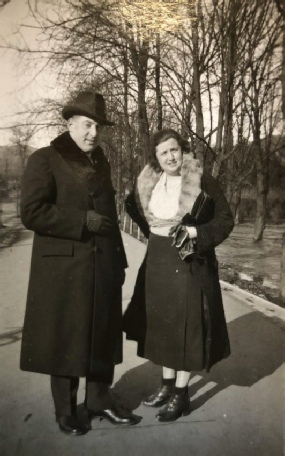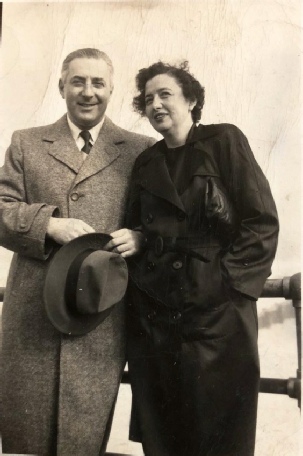Alice Glasnerová
Blogs:
2017
Thank you, Senator McCarthy: 18 Aug, 2017
Noel Field, soviet spy: 10 Sept, 2017
The
hunting dog finds a scent: 30 Sept, 2017
My past ghost: 24 Oct, 2017
Two worlds: meeting Alice for the first time: 26 Nov, 2017
2018
The London connection: 14 Feb, 2018
Stepping into the shadows: 13 March, 2018
Return
to the land of milk and honey: 22 April, 2018
Return to Czechoslovakia: 7 June, 2018
Dual
heritage: 18 June, 2018
Zilina, then and now: 1 July, 2018
A fateful triangle: Erwin, Noel Field and Alice: 29 Aug, 2018
Friends forever: 23
Oct, 2018
Lost luggage: 6 Nov, 2018
Questions of right and wrong: 20 Dec, 2018
2019
Letters from Alice: 26 Jan, 2019
A tale of two photographs: 1 March, 2019
In her father’s steps she trod: April 17, 2019
Prison visit: May 21, 2019
Cartoons and correctness: May 27, 2019
Visiting the dead: June 10, 2019
Alice in the archives: June 21, 2019
Dislocated worlds: May 12, 2019
Au revoir and not good-
Bienvenida Espana: 8 September 2019
Bullfighting in Albacete: 9 September 2019
Benicasim -
Surrounded by danger: 21 September 2019
Arrivals and departures: 29 September 2019
A place of execution (A cold afternoon): November 29, 2019
Seventy years on: 4 December 2019
Windows into the past: 10 December 2019
2021
Munich revisited: February 28, 2021
Will there be a Holocaust museum in Prague?: October 10, 2021
Statue wars: October 14, 2021
Transitional objects: October 21, 2021
My blogs
Windows into the past
December 10, 2019

Alice, Eva and their mother, Olga.
We sit around Alice’s table, Katerina, Jirka and me. The reason I am here, in this small flat on the outskirts of Prague in Novy Sporilov, is because of Alice, and the only reason we can communicate properly with each other is because Alice taught both Jirka and Katerina English, around this exact same table. Their mothers were close friends of Alice’s, and Katerina is the daughter of Milena Tauchmannova, who wrote the memoir about Alice that has given me so much information. Katerina now lives in Alice’s flat and a couple of pieces of Alice’s furniture remain here – the table and a large dark wood dresser.
I cannot believe that I am here, in Alice’s flat, sitting with people who knew her, who remember her impatience when they were late for the lesson or when they failed to complete their homework. Alice lived here with Eva, her sister, on the second floor of a newly built block with a lift, unlike the old blocks in central Prague where she lived on her release from prison. There is a large sitting room with a balcony, where Alice and Eva would sit and have a drink on warm evenings. Eva liked pelargoniums and so in summer the balcony was bright with flowers and as the area matured, trees grew and grass was laid, providing greenery all around. The tram journey into the centre is easy and I wonder whether the number 11 tram that we took was also the one that carried Alice in to concerts or to visit friends.
Amazing as this experience is, there is more to come. Katerina inherited Alice’s flat, but Jirka’s family inherited much of her furniture and belongings, including her photographs. He has brought them for me; two shoe boxes full and three albums from Alice’s childhood and youth. It is a treasure trove; I can’t wait to get back to the flat and look through.

At the flat, I start looking through the pictures and soon Alice’s features, with which I am now so familiar, are looking back at me through all the stages of life, from a small child in a pram to a studio photograph with her mother and Eva. They look so beautiful. There are pictures of Alice walking with other young people in the Slovak mountains, travelling to the Black Sea with Eva in later life, laughing with friends in America and even marching on demonstrations. Some of the pictures are tiny and the only way of distinguishing features is by photographing them with a phone and enlarging the image. There are also pictures of her in her final years, in colour, with young friends and their children.
Most amazing for me though, are the pictures of her with Erwin, with my father as
a young man, in his student days, in the early days of their marriage in front of
his library of books, in fur-


It is as if a world has been opened up to me. I couldn’t believe Jirka was giving them all to me, but now I realise that I am the only one to whom they are personal. Alice may not have been any relation to me, but she had no children, no nieces or nephews. And Erwin was my father, who else would have claim to photographs of him? To everyone else, at best, they are just vaguely interesting pictures of one of their parent’s friends. I am taking them home, despite Easyjet’s luggage restrictions, and spend a long time distributing them among our various bags. It would be lighter if I took the photos out of the albums but I can’t bring myself to do that, we’ll just have to pay extra.
When I started researching Alice’s life I had never seen a picture of her, I had never read a word she had written. All I knew was that she had been married to my father and had been a member of the communist party. Now, I have read hundreds of documents about her, I have read her articles, some of her letters and memoirs, her statements to the police. I have seen all four prisons where she was incarcerated, I have seen all the places where she worked in Spain, I have her school records. I have seen the record of her birth, of her marriage, I have walked the street where she lived as a child, I have stood outside her school, been into the strange shop that now inhabits the house where she and Erwin lived. I have stood outside her homes in Prague and the Law Faculty where she studied, even the court where she practised in Bratislava. Most of all I know the children of her friends, have sat at her table in her flat. And now, I can turn the stiff dark pages of albums that contain her memories: the days of a privileged childhood, of carefree and optimistic youth and of early love. Other photographs tell of her life after her release from prison, her closeness to Eva, their holidays at the Black Sea, time spent with friends and their children – a full life.

At the May Day parade
As I discovered on reading the memoir, despite the passing years, Erwin always held a place in her heart and this treasure trove of pictures proves it. It was a troubled relationship, but it was abruptly cut short by outside forces. In a previous blog I wrote about the letters they exchanged about the divorce, but more recently I have found another letter. Erwin wrote to Eva on July 24th 1949 asking why he had not heard from Alice in response to his letters and telegram about an upcoming trip to Prague. The date on the letter explains the reason; she had been arrested on July 7th. He never went to Prague, either then or later. The next time he heard from her was the formal letter asking for a divorce.
It isn’t logical, but I feel as if I am closing a circle, as if by trying to understand what happened and piecing together the story of their marriage that I am somehow healing a wound. I can’t change the past, or repair their loss, but I am regaining a part of my father and my heritage that he did not live to tell me about himself. Ironically, it is Alice who unwittingly held the key that has enabled me to unlock this past and provide a final chapter to their story.

In America